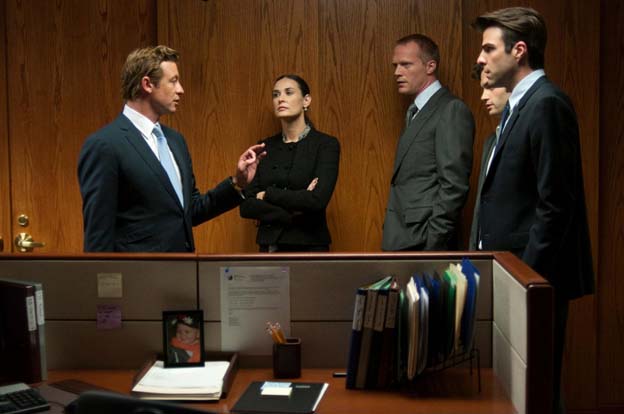On DVD: Margin Call
Few of us can truly grasp the economic fundamentals of the 2008 stock market crash—how it happened, why it happened. Most of what we understand are the after effects, the human consequences. Rookie filmmaker J.C. Chandor’s “Margin Call” attempts to merge those two understandings: the economics and the executive-level decision-making with the real-life impact and gravity of the situation on those with the power to make big choices.
“Margin Call” is not as sophisticated as you might think. For one, on at least three occasions a character requests that someone explain something to them in laymen’s terms. Normally, such convenient and patronizing dialog would be disastrous, but as the film progresses and we continue to observe how the decisions of few affect the lives of many, the choice begins to make sense: you don’t need to be a math and science wiz to call the shots.
The film opens with layoffs at an investment firm in 2008. Stanley Tucci’s character is among the victims of a rather succinct and soulless dismissal, but on his way out of the building, he hands a young analyst named Peter Sullivan (Zachary Quinto) a disc drive with the verbal addendum “be careful.” Sullivan tinkers with the information late that night when he discovers a pattern suggesting disastrous losses for the firm in the coming days.
Chandor’s script follows the journey of this piece of information as it climbs the ranks of the company and more and more decision-makers enter the process of determining what to do with it. It goes from Sullivan and his co-worker (Penn Badgley) to a trader on Sullivan’s floor (Paul Bettany), then to the trading head on the floor (Kevin Spacey) and then to a pair of senior-level executives (Simon Baker and Demi Moore) before reaching the CEO (Jeremy Irons). Each assesses and reassesses the situation before making a decision with ripple effects down the chain of command and then passing it to the next highest official.
The message is clear: the few in power outweigh the many. The bigger the problem gets, the harsher the decisions. Spacey’s character appears to be the stubborn bad guy toward the beginning, but he transforms into someone we pity by the end because of the way the higher-ups handle the situation. These changes in our character perception come swiftly and without making much of a peep, and in the control of some stellar actors, it’s more than a new filmmaker could ask for.
The trouble with “Margin Call” comes from an inability to connect with a wide, everyman audience. By and large, the problems and dire situations of the film are white-collar dilemmas: rich people trying to figure out how to stay rich. Without some other kind of connection to the material, which could be as simple as an interest in markets and investments, it becomes hard to care about the characters or the problems they’re dealing with. In spite of all the dialogue for dummies, much of what exactly is happening remains esoteric.
The human connection comes too little too late for “Margin Call,” though not in every sense. We do not see the impact of the film’s events on the everyman until late in the game, when the realization hits that the traders of the firm must respond to orders from the top that will have a very trivial impact on their careers, and at the same time even more folks are at risk of losing their jobs. However, the conflict on screen is person-to-person, and the characters wrestle with all kinds of issues regarding their livelihood, the greater good and the welfare of the company. The film doesn’t lack for humanity, it just lacks for gravity.
Quinto, Bettany, Spacey, Tucci, Baker, Moore and Irons assure a certain standard for “Margin Call.” They help put strong faces on talking heads arguing about issues far beyond the common person’s understanding. It’s not indecipherable gibberish or anything, but we can’t learn and understand the logic at the rate at which it’s explained, which means we can’t process the emotions that come with it. Regardless, the actors crucially help us to realize the impact of the circumstances and consequently the language we struggle to understand.
“Margin Call” offers a rare experience, a peek into the cold truth of the financial world that forgoes the imposition of your usual characterizations for businesspeople: cutthroat execs, poor obedient peons, etc. The short time frame of the film’s events helps give it a documentary feel minus a handheld camera or any found footage labels. The portrait is genuine, but debatably accessible.
3.5/5 Stars
Margin Call
Written and Directed by J.C. Chandor
Starring: Zachary Quinto, Paul Bettany, Kevin Spacey, Jeremy Irons






0 Comments
You can be the first one to leave a comment.